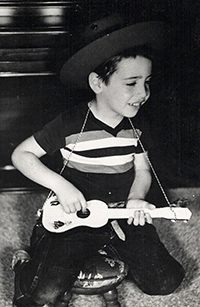Recently, I did a long interview with publisher Bill Piburn of Fingerstyle Guitar Journal. I'm on the cover of the current issue. The article covers most of my life in music. It was fun to do. Included is a cool transcription Bill made of my solo guitar arrangement of "Estate" (made famous by the great Brazilian guitarist, Joao Gilberto).
Here's a link to my solo guitar video of "Estate" on YouTube. https://www.youtube.com/watch?v=Ypr3Ui4UeEE
Fingerstyle Guitar Journal is a quality guitar magazine. I've subscribed for many years. Please consider subscribing. Every issue is excellent. Because of copyright, the music transcription is only available with a paid subscription.
Here is the link to Fingerstyle Guitar Journal: https://fingerstylejournal.com.
Be well and keep music in your life,
Stan
About
 I have been playing the guitar a long time.
I have been playing the guitar a long time.
But I started with the trumpet. I saw the 1959 movie "The Five Pennies" starring Danny Kaye. I had just turned nine years old. The film was about trumpeter Red Nichols, a hot jazz star of the 1920s and 30s, whose musical heroes were Louis Armstrong and Bix Beiderbecke. He leaves the music business when his daughter contracts polio. (This was a real threat to children in the 1950's and I was among the first to receive the Salk vaccine in 1955 when I was five years old. This shot in the arm reduced a lot of fear and helped to eradicate the disease. I know several people who are survivors of that epidemic). Eventually Red's wife and daughter encourage him to stage a comeback. An old friend gets him a gig in a small club. Red is nervous and disappointed that none of his old friends and musical buddies have come out to see him. He starts his set when after a few notes - out of the darkness - another trumpet is heard playing "Won't You Come Home Bill Bailey". The lights come up and it's Louis "Satchmo" Armstrong leading a crowd of Red's friends. Louis joins him on stage. Red's daughter surprises him by casting off her cane and asking him to dance with her. After dancing with his daughter (a young Tuesday Weld), Red returns to the stage and jams with Louis. They seemed to be having so much fun. Louis' off the charts charisma and great playing inspired me to take up the trumpet. I walked around our house gripping my trumpet and wiping my brow with a handkerchief like Louis. I played for a few months until my front teeth came out and I had to put down my horn.
Read more...


